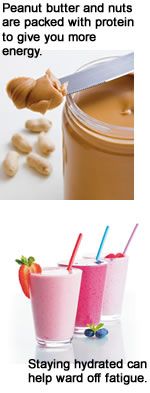A Healthy Boost
Fight fatigue with food and exercise

You wake up to the alarm blaring and cover your head with your pillow wondering how it could possibly be time to get up already.
Next, you are making yourself a light breakfast before you have to head out the door for your appointment and find you have to sit down to rest from the effort. If this scenario sounds familiar, you are not alone. Up to 96% of people treated for cancer report fatigue. How you eat, drink and spend your day can reduce your fatigue and may even boost your energy levels.
Eating for Energy

You may feel like you are fighting a losing battle with fatigue. The fatigue itself can hinder eating enough calories and protein to maintain energy by limiting your ability and desire to prepare healthy meals and snacks. This in turn will limit the amount you eat, which can result in more fatigue. If you are losing weight, it is important to eat more frequently to avoid losing muscle mass, which can lead to difficulty with daily activities. If you are not losing weight, it is important not to overeat for energy, as extra weight can worsen extreme tiredness. Choosing the right foods is key. Limit empty-calorie foods such as candy, soda pop, baked goods and other desserts. They may give you a quick energy boost initially but often will leave you feeling more drained once their effect wears off. Foods containing protein, healthy fats and fiber will give you more long-term energy, in addition to having more vitamins and minerals to support your body's needs. (For helpful tips for adding more healthy foods into your diet when you are running low on energy, see Tips for Healthy Eating.)
Drink up
Dehydration can make you feel drained. Make sure you drink at least eight to 12 cups of fluid daily to help you meet your hydration needs. Focus on drinking water if you have maintained your weight, or use calorie-dense items like 100% fruit juice, milk or sports drinks if you have been losing weight. Keeping a visual record of your fluid intake can be helpful so you keep on track. At the beginning of each day, fill a 2-liter (64 fluid ounces) container with tap water. Each time you drink any type of fluid or liquid-containing food (soup broth, ice cream, Jell-O), pour out that amount of liquid from the 2-liter container so that you have a running tally of your fluid intake for the day.
Is there any reason why I should not exercise?
Will I need any special monitoring before I begin exercising?
What exercises do you recommend for me?
Are there activities I should avoid?
Are there any warning signs I should look for when I start exercising?
Tips for Healthy Eating
Protein-rich foods:
- Fish, chicken, turkey, beef and pork
- Eggs
- Peanut butter or other nut butters
- Nuts
- Milk, cottage cheese and yogurt
- Soy milk, edamame and tofu
- Beans and legumes
Healthy fats:
- Walnuts, almonds or other nuts
- Olive, canola or safflower oil
- Fatty fishes, such as salmon, mackerel, herring, lake trout, sardines and albacore tuna
Fiber-rich foods:
- Cereals with 6 grams fiber per serving:
- oatmeal, raisin bran, shredded wheat, Grape Nuts and Kashi
- Bread with 3 grams fiber per slice
- Whole wheat pastas
- Legumes, lentils and beans
- Fruits and vegetables
Tips for Eating Healthy on Low Energy Days
- Eat small, frequent meals and include a protein-rich food with each meal or snack.
- Stock your pantry with extra staples to avoid frequent, energy draining grocery shopping trips.
- Keep high-calorie, high-protein nutrition supplements on hand for easy nutrition on the run, such as Boost Plus, Ensure Plus, Carnation Instant Breakfast or nutrition bars.
- Try batch cooking. Ask family or friends to double a favorite recipe or do so yourself on high-energy days. Freeze individual portions for quick, healthy meals.
- Keep healthy foods on hand that require little preparation, including pre-packaged pudding and yogurt cups, peanut butter, tuna fish, cottage cheese, eggs, string cheese and soup. (Select cream-based soups for added calories and protein.)
Read the Spring, 2011 issue of Thrive.
